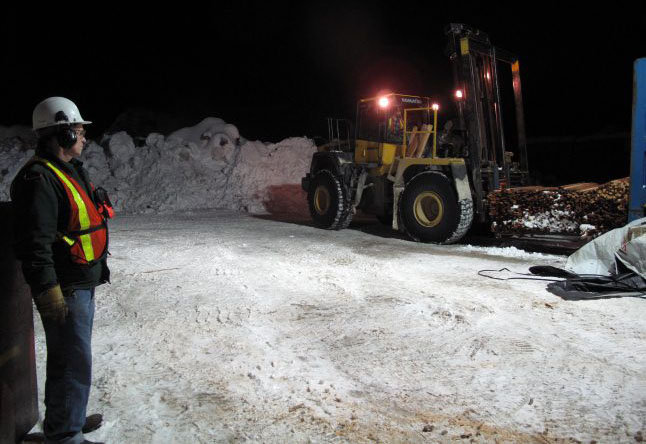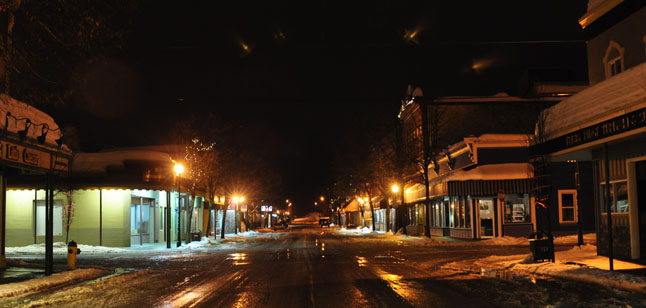
By Laura Stovel
It’s 3:00 on a chilly Monday morning. The streets of Revelstoke are still, with only the distant rumble of a passing train. Here and there a bedroom light glows, indicating that someone is, perhaps reluctantly, awake. But inside the Chalet Bakery kitchen the CBC radio is blasting while baker Kyle Johnson deftly cuts cream roll pastries and rotates them in spirals around a stick. Within minutes, two neat rows of pastries on a sheet are ready to bake in the walk-in oven from which Johnson has just pulled a trolley of nicely-browned sausage rolls.
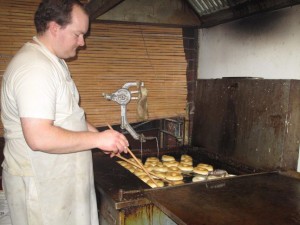
Johnson is one of the workers who, almost unnoticed, keep Revelstoke running overnight: bakers; hospital workers; railway workers; night watchmen; taxi drivers; snowplow drivers; workers at Denny’s restaurant and Tim Horton’s; cashiers at gas stations and convenience stores; and staff at residential care facilities. Who are these workers? Why do they choose to work night shifts? And how does this work affect their lives?
For some, night work is a preference. Ray Peterson, a residential care worker for Community Connections, said “I’m not a morning person. For some reason it’s easier to wake up at three in the afternoon. It’s always been like that. I’ve been working night shifts for all of my adult life.” Before working in the Community Connections group home for adults with special needs, Peterson was a night watchman and a night shift taxi driver. Community Connections has day shifts and overnight sleeping shifts at their residences but Peterson prefers to take the waking night shift.
Working night shifts has allowed Peterson to spend more time with his children. “I come
home after a shift and get them off to school then sleep from 9:00 to 4:00 in the afternoon. The thing about night shifts is that I always have the evenings so I probably see my kids more than many other parents. I never miss the band concerts or the hockey practices.”
Ed Freer, a night watchman at Downie Sawmill, also prefers night shifts and felt it gave him more time to enjoy his children when they were young. “Years ago, I’d be on graveyard while the kids were sleeping. I’d get up and was there for a good portion of the evening.” He mentioned that another father at the mill asked to switch to graveyard shift for that very reason.
Night shifts are not always good for families, however. Johnson, the night baker, is recently divorced and is now a single father. He is finding that
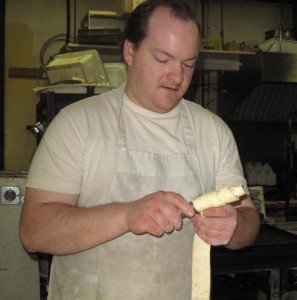
his chosen career means that he spends less time with his children than he would like. His children, aged two and five, spend their nights in childcare. “It would be easier to have my kids sleep with me and to work in the day,” he said. “If I worked in the day they would only be in childcare for eight hours. Now they are in childcare for 15-16 hours.” Johnson sleeps from 6:00 p.m. to midnight then works from 1:00 until 9:00 a.m. “I can’t sleep in the morning because I pick my kids up (from childcare) at 9:00,” he said.
For Johnson and his boss, Chalet Bakery owner Brigette Sonnenberg, providing freshly baked goods to the people of Revelstoke is a vocation, but it’s also a sacrifice. “It’s difficult,” says Sonnenberg, who, until recently, also worked night shifts. People “have no idea the effort that goes into (producing their baked goods) while they are tucked up in their beds.” She adds, “It’s not natural for humans to work nights. I can work a lot harder on a day shift. It’s just that circadian rhythm that hits you” when you change from day shifts to night shifts. “The older I get the harder it is for me to make the change.”
While some night shift workers genuinely prefer working nights, others do so because they have few options. With the cost of living in this resort town rising dramatically, some minimum-wage workers in Revelstoke have to work two or three jobs just to support themselves.
Two convenience store workers (who cannot be named) said that they choose to work only night shifts so that they can also work during the days. One worker, who recently completed college and is paying off education debts, has three jobs; the other works two. “I would not work night shifts if I had a choice,” one said, “but this allows me to have other jobs.” The worker observed that with all the people coming from out of town to ski, the job market is actually getting tighter as skiers take on local jobs to support themselves while they are in town.

A number of employers pay more for staff who work night shifts. Tim Horton’s restaurant is one such employer. Three years ago, when the ‘roll up the rim’ promotion was on, the Revelstoke Tim Horton’s restaurant was very busy and short of staff. “We had people who wanted to work night shifts,” owner Brian Lecompte said, “but we needed them to cover the busy day and afternoon shifts.” They had 40 staff but they needed about ten more. Lecompte and his wife, Donna, applied to bring in temporary workers from the Philippines, some of whom work night shifts. “We pay them more anyway,” he said, “and they are awesome workers.”
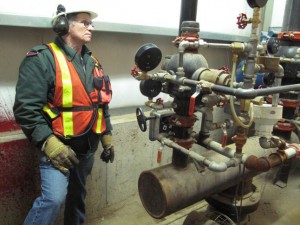
Everyday appointments can be a challenge for night shift workers who sleep during daytime working hours. Both Peterson and Sonnenberg stress, “Don’t phone during the day.” “I hate telemarketers.” Peterson said, “They are probably the biggest pain for people who work night shifts.” He added that medical and car repair appointments are hard but appointments with repairmen who do not specify a time when they will arrive are “brutal.”
Sonnenberg also struggled with daytime appointments when she worked night shifts and has trained her suppliers to e-mail her instead of phoning.
Only one night shift worker interviewed said that working nights worked well with his social life. Ed Freer, who sleeps five hours in the morning and takes a two-hour power nap before work, said that this schedule frees him to go out in the evenings and to “have coffee with the klatch and have a few chuckles.”
Others find that night work can be an isolating experience. “What personal life?” said Sonnenberg. “I live with my three cats.”
Johnson agreed. “The frustrating part about night work is not getting enough sleep and not having a social life. It would be nice to have another relationship. I’m usually very shy. I need to get out and meet people.”
Peterson says that his family is his social life. His wife also works the night shift at Denny’s restaurant so they are on the same schedule. “I don’t get out much,” he said, “but when I have a family, that’s ok.”
At Downie Sawmill Ed Freer zig-zags across the mill, checking temperature and pressure gauges, keeping an eye on lights that might overheat, watching for anything unusual. “Some people ask me whether I get bored,” he said. “There’s too much to be watching for for my job to be boring. There’s always something possibly happening.”
Being successful in night shift work “is all in your mental attitude,” Freer said. “Breakfast doesn’t have to be breakfast. It can be eaten at any time of the day.” While others deal with everyday work problems, “with the graveyard shift, I only deal with solitude.”
